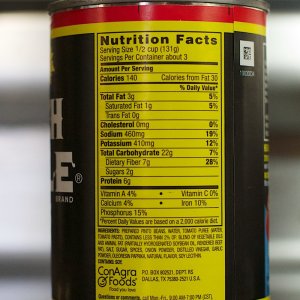Help…I’m an Athlete with High Cholesterol!


Image from CC0 Public Domain
When I scheduled my first well visit with a new primary care doctor in probably 10 years, I was most concerned about osteoporosis. I was a bit surprised that he didn’t even order a bone density scan but I guess I have a couple more years before that is necessary.
He did, however, order all of the routine blood work. I wasn’t terribly worried. I eat relatively healthily (and gluten-free because of intolerance) and I exercise four to six days a week. I don’t smoke, rarely drink and have a fairly low level of stress.
Given all this, imagine my surprise to find out that I have high cholesterol. I was stunned. I asked him for the breakdown between the good and bad cholesterol. He answered that I have lots of good but also lots of bad and that I should watch what I eat and exercise. Two things I already feel like I am doing.

Image from CC0 Public Domain
Panic mode: I couldn’t find the cholesterol
Then I went into full-blown panic mode. Scrutinizing the labels of everything I ate regularly and reading and researching cholesterol.
The odd thing was that most of what I eat during the day has little to no cholesterol, according to the labels. The only thing I found that had cholesterol in it was cream cheese, which I then started smearing on my gluten-free bagel in scant amounts instead of the liberal smear I was used to.
I was confused. How could I have high cholesterol when it seemed like a few things I ate actually had cholesterol in them? I just wanted someone to tell me where it was coming from so I could stop eating it. Unfortunately, it’s not that easy.

Image from CC0 Public Domain
Cholesterol: what is it?
Cholesterol is a waxy, fatty substance naturally occurring in the body. “Waxy” and “fatty” are two things that sound like they should be avoided but cholesterol is necessary for our bodies to function properly.
On the cellular level, cholesterol is critical as it contributes to cell membranes. Cholesterol also is used to make hormones and vitamin D as well as a number of other important functions.
Because it is necessary for bodily function, your body makes all the cholesterol it needs. This is blood cholesterol. But, the body also absorbs a little cholesterol from your diet, which obviously is dietary cholesterol. Previously, the thinking was that dietary cholesterol raises blood cholesterol, which can, in turn, lead to heart disease but today’s scientific evidence no longer totally supports that theory.
I was planning to read the labels of what I was eating, find out where the cholesterol was coming from and stop eating it. Although it seems like it should be that simple, it isn’t. Dietary cholesterol doesn’t often change blood cholesterol levels dramatically, much to my chagrin. Still, there are ways to improve your cholesterol, which shouldn’t be overlooked.

Image by cattalin from Pixabay
Lowering cholesterol: no easy task
There are three numbers that make up a cholesterol reading—LDL or low-density lipoproteins, HDL or high-density lipoproteins and the total cholesterol number.
LDL is considered the “bad” type of cholesterol, which may contribute to heart disease. HDL is the “good” type of cholesterol. Raising your HDL levels will help protect you from the detrimental effects of LDL.
Eating certain foods—fatty fish (salmon, for instance), legumes, fruit, whole grains, and olive oil—can all help raise your HDL level. In addition, avoid saturated fat, which can be found in full-fat dairy products and meat, and trans fats, aka partially hydrogenated oils, which can be found in many baked, processed and fried foods. These can raise your LDL level.
Additionally, many dieticians encourage looking at your entire diet and not just focusing on cholesterol and fats. The fiber in fruits, vegetables and whole grains like brown rice, oats, barley, and quinoa can help lower cholesterol. Reducing refined sugar is also recommended.
Raising your HDL and lowering your LDL through dietary changes may not be successful in decreasing your overall cholesterol number, particularly if you have a family history of high cholesterol. Although in the end, you may end up on a cholesterol-regulating medication, it is worth a try to lower it on your own.

Image from CC0 Public Domain
Other factors at play: look at your lifestyle
In addition to paying attention to diet, there are a handful of lifestyle changes that might help lower your overall cholesterol number. Of course, you have most likely heard them all before but they bear repeating: exercise regularly if you don’t already, stop smoking, limit alcohol and reduce stress.
Some supplements—like fish oil or cod liver oil capsules—are thought to help lower cholesterol with their omega-3 fatty acids. Supplementing your diet with fish oil capsules may be a good idea if you don’t eat two to three servings of non-fried fish per week.

Image from CC0 Public Domain
Call in an expert: a registered dietician
The admonishment from my doctor to eat better and exercise regularly was a little frustrating. I do exercise regularly and I already was eating a relatively healthy diet. Online research was a little helpful but there is so much information to wade through—some of it not always accurate and some of it downright confusing.
To point me in the right direction, I enlisted the help of my local grocery store’s registered dietician. We toured the store during which she pointed out healthier options available as well as gave advice about how to choose and prepare more healthful fare.
Some of her tips included:
- No matter how many vegetables you currently eat, eat more!
- Build your meal around vegetables and use meat as a condiment.
- If one of the reasons you don’t eat more vegetables is because of the prep time, take advantage of pre-cut veggies.
- Eat more fish!
- Although pork has been marketed as “the other white meat,” it is not chicken. Think of it the same way you would think about red meat.
- Watch out for fats in things you wouldn’t expect. For instance, I didn’t realize frozen French fries are usually fried before they are frozen. Even though the ones in my freezer are trans-fat-free, they did include a bit of saturated fat. Those bits of saturated fat can add up.
For accurate, up-to-date information about diets, nutrition and heart health, including additional information on cholesterol, visit the Academy of Nutrition and Dietetics at eatright.org or the American Heart Association at americanheart.org. For more personalized information, consider visiting a registered dietician. One can be found through the “Find an Expert” option at eatright.org.
Sources
Latest Articles
 Is Running on a Treadmill Easier Than Running Outside?Runners have their own preferences, whether it is treadmill running, running outside on the road, or exploring trails. So...
Is Running on a Treadmill Easier Than Running Outside?Runners have their own preferences, whether it is treadmill running, running outside on the road, or exploring trails. So... Is It OK to Use Trail Running Shoes on the Road?While trail running shoes can be used on roads, especially in situations where a runner encounters mixed terrains or pref...
Is It OK to Use Trail Running Shoes on the Road?While trail running shoes can be used on roads, especially in situations where a runner encounters mixed terrains or pref... How to Fix Sore Quads After Running?Rest, ice, gentle stretching, and over-the-counter pain relievers can help soothe sore quads after running. Also, ensure ...
How to Fix Sore Quads After Running?Rest, ice, gentle stretching, and over-the-counter pain relievers can help soothe sore quads after running. Also, ensure ... 10 Fruits With The Most Electrolytes to Replace Sports DrinksThese fruits are high in electrolytes such as potassium, magnesium, and calcium, essential for hydration, muscle function...
10 Fruits With The Most Electrolytes to Replace Sports DrinksThese fruits are high in electrolytes such as potassium, magnesium, and calcium, essential for hydration, muscle function...

